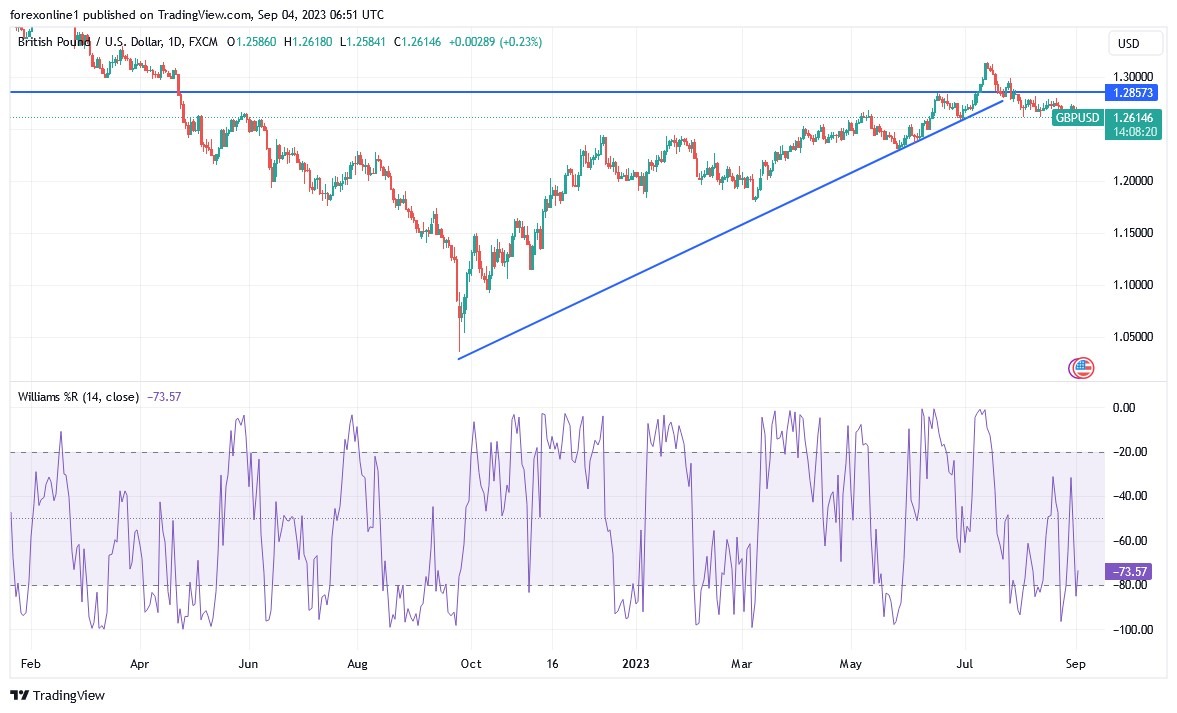[ad_1]
It has been expected that the downward trend of the currency pair GBP/USD will become stronger. An attempt for the currency pair to rebound upwards may be an opportunity to sell as this happened last week when it jumped up towards the resistance level of 1.2746. It will soon move again on its broad downward path with losses of the 1.2577 support level. This level closed the week’s trades and was stable. The factors of the American dollar moving up strongly, and the sterling, on the other hand, has not recently received any injury to reverse the trend.
The pound appears to be vulnerable to losses against the dollar over the coming weeks of September according to new analysis released at the start of the new month. In this regard, George Vesey, forex analyst at Convera, the international payments company, formerly known as Western Union Business Solutions, says: “The exaggeration of possible prices makes the pound sterling vulnerable.”
Forex Brokers We Recommend in Your Region
See full brokers list
These expectations come after the GBPUSD exchange rate recorded a loss of 1.25% for the month of August, a result not entirely unexpected given the pair’s strong seasonal tendency to decline in August. The analyst pointed out by saying that “seasonal trends persisted for the British pound during the month of August as it fell against the US dollar. The GBP/USD pair fell by more than 1% to record only its third monthly decline so far this year.”
Returning to the forecast, Reuters analysts point out that September tends to be another month that favors the dollar from a seasonal perspective. In this regard, Martin Miller, a market analyst at Reuters, says “the performance of the US dollar index DXY for each September since 2000 shows that it has risen in 14 of the past 23 years, including each of the past six years, highlighting the possibility Existence of internal upward structural bias. And while seasonality should not be considered in isolation, it can be beneficial when combined with other factors.”
The analyst notes that the monthly chart setup also looks bearish, “which means a softer start to September could unfold.”
The analyst interprets the recent comments made by the chief economist of the Bank of England Hugh Bell in Cape Town as “not too hawkish”, indicating that there may be some disappointment in store for the sterling in relation to the Bank of England’s interest rate policy. A keynote address delivered by the Chief Economist indicated that he prefers to keep the Bank of England’s interest rate at its current rate of 5.25% or that it is necessary to raise the interest rate only once compared to current market prices, which includes at least two additional increases. But in another rejection of market thinking, he also insisted on keeping interest rates at current levels for some time to ensure inflation returns to target.
For his part, Bank of England Chief Economist Bill told the biennial South African Reserve Bank conference: “At the moment, the focus is still on ensuring that we – in the words of the Monetary Policy Committee’s recent statement – are tight enough for long enough to ensure that we get those The permanent return to the goal”.
However, the analyst cautions that some leading economic indicators in the UK, as well as underlying effects, point to lower inflation in the short term. This, along with further economic weakness in the UK, suggests that the market is pricing in the Bank of England’s interest rate expectations to remain very aggressive, leaving the pound vulnerable. he added. While the current yield spreads still point to an upside range for the pound, this change in the stance of Administrator Bill, who has been on the hawkish side until now, may limit the possibility of the pound going higher from here.
Conifera’s daily chart studies at the same time indicate that daily momentum readings have turned negative, turning the RSI bearish. A break of the 100-day moving average support could open the door to a test of the $1.25 support this month. Meanwhile, following the Eurozone inflation data, GBP/EUR looked set to test €1.17 again after its biggest two-day rise in more than two weeks. However, the currency pair started the day on the softer side.
- According to the performance on the daily chart below, the general trend of the GBP/USD currency pair is still downward.
- Its recent losses are enough to push the technical indicators towards strong selling saturation levels.
- One can consider buying from its lowest levels with no risk from 1.2540 and 1.2470 respectively.
The 1.2850 resistance level may be important for the bulls’ control because it will push it to the 1.3000 psychological resistance after that, the most important level to change the direction of the currency pair to an upward one. Today the currency pair will continue to react to the reaction to the latest American jobs numbers and the statements of the Bank of England officials. There may be a narrow movement in the light of the American holiday and the absence of important and influential economic releases.
Ready to trade our Forex daily analysis and predictions? Here are the best forex trading platforms UK to choose from.

[ad_2]